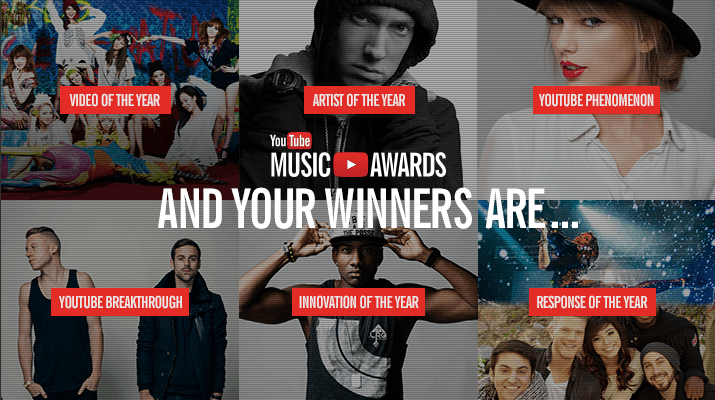The YouTube Music Awards happened for the first time ever last night, and from the looks of reviews from GigaOM, the Los Angeles Times, and TIME, the awards were “a train wreck”, a “hot mess”, and had major “growing pains.” However, there were several aspects of the event that made its originality something to note.
The event lasted about an hour and a half and were streamed live. Headliners included Lady Gaga and Eminem and the show was produced by Spike Jonze and was hosted by actor Jason Schwartzman and musician/comedian Reggie Watts.
Besides performances, Youtube did give away actual awards (as a 3D version of its iconic red play button), including to Taylor Swift, Eminem, and Macklemore & Ryan Lewis.
What Was So Awkward?
The awards’ unscripted feel lead to a lot of awkward moments, including crying babies on stage during Macklemore & Ryan Lewis’ acceptance speech, a shaky camera that lead many to complain of motion sickness, and dead time Schwartzman and Watts had to fill due to technology and live stream glitches before performances.
How Does This Affect The Future of YouTube?
Awkwardness aside, the #YTMAs were a display of YouTube’s dedication toward what drives the majority of its traffic: music videos. YouTube’s future lies in music, as well as how it handles live events. Many are speculating the the YouTube Music Awards were one step closer toward YouTube officially announcing a paid streaming music subscription plan, similar to Pandora or Spotify, for about $10 per month, according to the New York Times.
Tech glitches aside, the live streaming of the event ushers in the continuous movement in online and streaming video as an alternative to traditional cable networks. Netflix, Aereo, and others are working to provide a strong substitute to regular cable or satellite programming. Exinda states that Netflix traffic accounts for 30% of all US online traffic during peak hours and 6 billion hours of YouTube video are watched every month.
What Does This Mean For Marketers?
This could mean more advertising and content creation opportunities, thanks to a growing online user base. YouTube already began rolling out paid channels for content creators in May, which allows users to begin charging a monthly fee in order to view their content, according to USA Today.
But whether marketers are looking to create paid content, advertise on it, or simply look for a way to increase brand awareness, YouTube’s Music Awards shouldn’t go unnoticed. Their ability to attract huge talent and broadcast the event solely on its own platform should make marketers think more about their own videos, musical or not.
featured image via @YouTube





![[SEO, PPC & Attribution] Unlocking The Power Of Offline Marketing In A Digital World](https://www.searchenginejournal.com/wp-content/uploads/2025/03/sidebar1x-534.png)